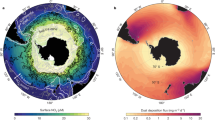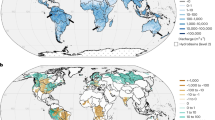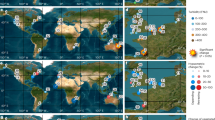Abstract
SEDIMENT cores were obtained from the Iberia Abyssal Plain and the Biscay Abyssal Plain1 on a cruise of R.R.S. Discovery II in 1958 organized by the Department of Geodesy and Geophysics of the University of Cambridge. These cores consist of beds of sediment deposited by turbidity currents, which are sometimes only a few cm thick but are more often 50–100 cm thick, and alternating with these beds is normal pelagic sediment, not thicker than about 40 cm. These cores have characteristics similar to those of abyssal plain sediments elsewhere described by Ericson and others2.
This is a preview of subscription content, access via your institution
Access options
Subscribe to this journal
Receive 51 print issues and online access
$199.00 per year
only $3.90 per issue
Buy this article
- Purchase on Springer Link
- Instant access to full article PDF
Prices may be subject to local taxes which are calculated during checkout
Similar content being viewed by others
References
Heezen, B. C., Tharp, M., and Ewing, M., Geol. Soc. Amer. Spec. Paper 65 (1959).
Ericson, D. B., Ewing, M., Wollin, G., and Heezen, B. C., Bull. Geol. Soc. Amer., 72, 193 (1961).
Tsernoglou, D., M.Sc. Thesis, Dalhousie University (1962).
Author information
Authors and Affiliations
Rights and permissions
About this article
Cite this article
DAVIDSON, C., KEEN, M. Size Analyses of Turbidity Current Sediment. Nature 197, 372–373 (1963). https://doi.org/10.1038/197372a0
Issue Date:
DOI: https://doi.org/10.1038/197372a0
Comments
By submitting a comment you agree to abide by our Terms and Community Guidelines. If you find something abusive or that does not comply with our terms or guidelines please flag it as inappropriate.



